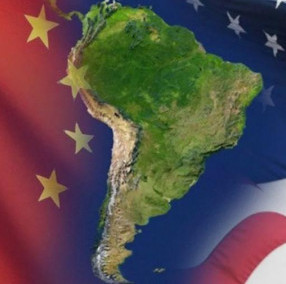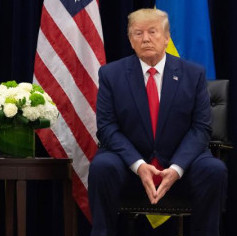The Arab monarchies of the Persian Gulf are obviously in a hurry. The Syrian regime’s obstinacy has already considerably dragged out “the revolutionary process” in the Syrian Arab Republic and “eats” huge amounts of Quatari and Saudi budgets. And therefore it is time to think about the transition to a “surgical” intervention.
And now, the same indefatigable Emir of Qatar Hamad bin Khalifa al-Thani on January 14 in an interview with the American CBS TV channel throws an idea of bringing an Arab contingent to Syria under the auspices of the League of Arab States.
It is clear that this was all done in reliance on the initiative pickup by “power players”, as well as on “warming up” the situation on the eve of the final report of the head of the Arab League monitoring mission in Syria, Sudanese General Mohamed Ahmed Mustafa al-Dabi. Because you know, it is clear that at the moment the LAS has no mechanisms required for joint military operations. And, in fact, the only experience in 1961 of brining the United Arab troops to Kuwait will not clearly be useful.
However, it is here important that this statement was, in fact, the first specific proposal for military intervention since the beginning of “the Syrian revolt” in March 2011. In general, all is in the spirit of “dear old Blighty” of the XIX century. And be now the legendary chancellor Otto von Bismarck alive, he would have probably said about Qatar that this country is looking for someone who for its benefits would be ready to “pull the chestnuts out of fire”.
However, the “Libyan” scenario has failed so far. The LAS Summit has declined the proposal of the Qatari Emir, which was actually the first warning light flashing for the “small, but smart” Gulf monarchy since the beginning of the revolutionary events in the Arab world. But more on that later.
At that time Doha “brought to grass” the “Yemeni” scenario: the resignation of the president of Syria Bashar al-Assad, the transmission power to the vice president, beginning dialogue with the opposition for two weeks, as well as the formation of a government of national unity in the SAR within two months. A joint statement of six Arab “hydrocarbon” monarchies of the Gulf stressed that the decisions adopted on 22 January at the headquarters of the LAS are “an important step to increase pressure on the regime in Damascus,” and that members of the UN Security Council and the Islamic states “need to force Syria to implement a plan of surmounting the Arab crisis.”
Signs of the Arab split
However, it is obvious that after the Arab League summit in Cairo, representatives of Qatar and Saudi Arabia were unhappy with not only a failure of the idea of brining the Arab contingent to Syria, but also with an “excessively balanced”, in their opinion, report of the Arab League’s monitoring mission to Syria, led by the above said Sudanese General al-Dhabi. All the more so, the official Damascus had no comment on the report of the Head of the LAS mission, and the official Syrian media even noted therein “an objective assessment of the situation in Syria”, and were particularly pleased to focus on the mention in the paper of “subversive activities of the armed anti-government groups” acting in the country.
This may also explain the demarche first by Saudi Arabia, and then also by other member countries of the Cooperation Council for the Arab States of the Gulf with recall of their observers from the Arab League’s mission. Officially, the Gulf monarchies have explained such move as “a desire to encourage the Syrian authorities to implement the Arab “roadmap”.
However, from all appearances, the main purpose of this campaign is to delegitimize the monitoring mission of the League in Syria, as well as to force the Sudanese General al-Dhabi to resign from his post as Head of Mission. By the way, this is the very al-Dhabi, who participated in the negotiation process with the Qatari on Darfur, and, as some believed, was “tamed” by Doha. It is obvious that the official Khartoum is fully aware that Sudan may well be the next country where Al-Jazeera may expand its propaganda activities. Fortunately, here there is what to play for. And the Sudanese leader al-Bashir might as well recall whether he did not let drop something offensive against the Qatari Emir’s appearance or his country’s size, as once Gaddafi and Mubarak recklessly did.
However, not only Sudan began to worry. Besides it, Egypt, Algeria, Iraq and Lebanon have declared for the continuation of the Arab League mission of observers in Syria. “The oppositionists” to Qatar and its company expressed confidence that the work of the mission will contribute to preparation for the dialogue and the period of transition. In general, the Arab world has divided. The excessively active intervention in internal affairs of Arab countries on the part of the Persian Gulf monarchies, in the first place, Qatar and Saudi Arabia, began to openly annoy the other states of the League, which do not want to become obedient executors of the will of others.
A new “chimera”
It should be noted that the current transformation of the LAS in a “subsidiary” of the Cooperation Council for the Arab States of the Gulf seems quite natural. Regular “PR-activity” on the part of the LAS, we could see in recent years, attempts to prevent the independence (and, hence, uncoordination) of the Arab states’ actions, proved ineffective. In addition, there were persistent suspicions among representatives of different Arab countries in “excessive overtures” to Washington, and indeed to the West in general, as well as permanent “jealousy” of the leading Arab countries to each other was obvious.
Under such conditions by tradition the so-called “extraterritorial Islamist organizations” (some experts in their comments call them “religious orders”) began to go to the forefront in the region, as was clearly indicated by the situation in Iraq, Lebanon and in the Palestinian territories (especially in Gaza).
By the way, Qatar is well qualified as a “religious order” with messianic ambitions. And here is a lot of money and energy to boot. Well, how not to imagine itself a new integrator and not to start to “format” the unbalanced Arab world?
However, after the Tunisian-Egyptian “Blitzkrieg” exactly the Libyan events have shown that the process is not as smooth as might be desired. In Syria, all has completely stalled. And revolutionary “rears” went out of order to boot. Now the President of Tunisia, Moncef Marzuki said to spite Doha that the bringing of troops to Syria will lead to war across the region involving Turkey, Israel, Iran and Hezbollah. Now realistic configuration of collusion between Egyptian “Muslim Brothers” and the odious Supreme Military Council of the Arab Republic of Egypt has come into view.
History has known many who wanted to drive the Arab world to their “Procrustean bed”. And always it looked like some kind of unnatural “chimera”. Maybe because this world is so much different. And the present Qatari “chimera” seems perhaps the most odious. And it is symbolic that the Syrian land begins to sober up from another adventure this motley world, from Iran to the Atlantic.









